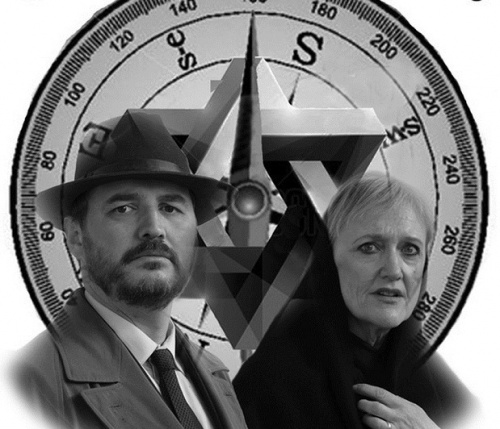GEOGRAPHY OF LOSS
Elmwood Theatre, 31 Aikmans Road, Merivale, Christchurch
15/10/2014 - 25/10/2014
Production Details
Geography of Loss is a story of resilience, hope, perseverance and homecoming, located firmly in Aotearoa New Zealand.
The script is based on a true story, the lives of ‘Deborah’ and ‘Jack’, their extended family and forebears. It is the story of one family, yet, at the same time, of many families from many cultural backgrounds. A story of upheaval and migration that needs telling over and over. It shows the lasting effects of loss, but also showcases resilience, perseverance, hope and homecoming, and comes to rest firmly in Aotearoa New Zealand, these shaky but beautiful isles.
Many people, particularly from Christchurch, will identify with the themes of this play, recognising parallels to the losses and uncertainties in their own lives following the earthquakes. They will also see the same hope and strength that carry them through their adversities to new beginnings.
If we look back far enough, all New Zealanders are immigrants. Now as Kiwis we strive to find common ground without losing our unique characters. The search for identity affects us all.
Geography of Loss is a professional production engaging experienced director, actors and lighting design. The script is innovative, containing many voices. The staging will be sparse and atmospheric, incorporating projected images.
Elmwood Auditorium, Elmwood Normal School, Aikmans Road, Merivale, Christchurch
Wed 15 – 25 October 2014
7.30pm; Sat matinees 3pm (Wed-Sat only)
Adults/Seniors: $20.00
Unwaged: $15.00
High School Students: $10.00
Group concession for 6: $100.00
Group concession for 10: $160.00
Buy Tickets (Additional fees may apply)
Website: www.bookingsgeographyofloss.com
Cast(in alphabetical order):
Julian Anderson
Helen Moran
Peter Rutherford
Rebecca Sandys
Lighting Design – Jo Hayes
Lighting Operator – Alexandra Le Cocq
Sound Design – Martin Howells
Audiovisuals – Brenda Hayes
Set Design – Chris Reddington
Much works well on stage; some more suited to page
Review by Erin Harrington 19th Oct 2014
Geography of Loss is an autobiographical piece, in which playwright and poet Karen Zelas explores family myth and cultural heritage. The play, which is written expressively in poetry rather than straight prose, outlines the intertwining nature of loss and hope, the cruelty of history and the extraordinary will of ordinary people. It considers the way that we are each a point of intersection of disparate, random influences, of lines of flight (both metaphorical and actual) and – for so many New Zealanders – children of migrants.
There is a particular emphasis upon the Jewish diaspora and the Holocaust, and the way that people bring their faith – whatever that may mean for them – with them from place to place.
All this ties into the here and now through a subtle engagement with the aftermath of the Christchurch earthquakes, through a moment where the breaking of a glass during an aftershock sparks a memory of Kristallnacht and the deportation and murder of family members in Nazi concentration camps.
Together, these elements form a fragmented picture of one particular family, while also looking to the way that all families are defined by remembrances and family myths.
The action swiftly moves from country to country and from era to era. Four actors – Julian Anderson, Helen Moran, Peter Rutherford, and Rebecca Sandys – offer committed and empathetic portrayals of four generations of family members. The playing space is a large open-carpeted area with props lining the mat’s edge, and the players, directed (or, perhaps, choreographed) by Martin Howells, use the open space of the Elmwood Auditorium well.
Hanging behind the action is an ingenious set piece, designed by Chris Reddington, which initially resembles deconstructed picture frames or intersecting pieces of a puzzle, but which has a house-shaped white space in the centre that resolves itself in the dark and becomes a screen for projections of historical images and family photos, designed by Howells and Brenda Hayes.
The lighting and sound design (Jo Hayes and Howells respectively) is quite involved and very well integrated and executed by operator Alexandra le Cocq. The costumes – grey shirts and dark trousers for the men and white dresses for the women – are lovely in their tailored simplicity. Aesthetically, it’s a beautifully presented package.
During my usual post-show eavesdrop I keep overhearing the same words – moving, beautiful, poetic – and think that these are fair comments. Geography of Loss is a very personal piece that aptly explores both the impact of history upon individuals and the near magical way that people come to be a part of one another’s lives.
However, while this production is very polished and certainly has a strong clarity of purpose, and while its lyricism is sometimes quite beautiful, there are many moments where I find that the high poetic register and the stylised action tip the scales from abstraction into, at best, breathy earnestness and, at worst, self-indulgence.
Some things work very well, such as the observation that things happen and people move by degrees, alongside the positioning of individuals by their latitude and longitude. However, the script’s problems are most apparent during a refrain about the way that people find one another; one of a number of moments in which the cast circle the playing space and their voices become an aural tapestry of repeated short statements (I find you, you find me, we find…) that ends with an ardent “finding is a-[beat]-mazing” that I find quite uncomfortable and awkward.
Certainly a lot of the poetic language makes for excellent theatrical material, but I suspect that, without the judicious application of a dramaturg’s red pen, I would enjoy portions of this piece more on the page than on the stage.
Copyright © in the review belongs to the reviewer





Comments